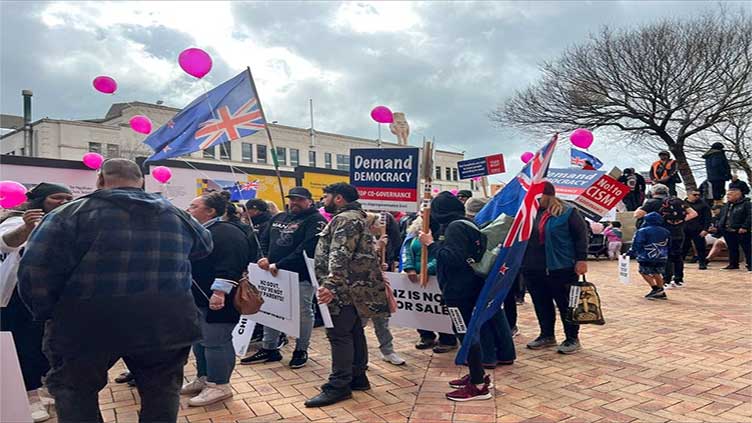Race issues emerge in New Zealand's election

World
Race issues emerge in New Zealand's election
WELLINGTON (Reuters) - Race and relations with the indigenous Maori population have emerged as issues in New Zealand's election as right-wing parties likely to be pivotal in forming a government face accusations of stoking racial division.
When Jacinda Ardern led her Labour party to a landslide victory in 2020, New Zealand stood out with progressive policies at a time when many countries had elected right-wing governments.
Three years on, New Zealand is seeing a growing populist movement that could hold sway over a coalition government and push to remove programs that were designed to address inequality and boost the presence of Maori.
This election, the "racism is more overt," said Naida Glavish, a Maori community leader and president of Te Pati Maori. She was one of a group of high profile elders who wrote an open letter last week condemning what they called unacceptable levels of racism from political candidates running in the Oct. 14 election.
Both the right-wing ACT Party and populist New Zealand First are promoting policies that would rewind changes that occurred in New Zealand under the Labour government to better acknowledge Maori as the country’s first people.
ACT has railed against "co-governance" or the sharing of some management between the state and indigenous people, and has vowed to wind back the use of Maori language in everyday life and dismantle the Maori Health Authority, which was set up to counter systemic disadvantage.
Both ACT and New Zealand First say their policies are not racist but instead are promoting the equal rights of all New Zealanders, with the argument that non-Indigenous citizens are losing out because of policies designed for Maori.
"The public service is meant to serve all New Zealanders, but even administration and service delivery has become focussed on race. This isn't a true focus on equity, serving citizens based on their measured need rather than their ancestry is," ACT leader David Seymour said in a fund-raising message to voters.
Seymour has also said he would shut the ministry set up for the advancement of Pacific People.
"I think some of our politicians are certainly playing the race card in this election," Prime Minister Chris Hipkins said at a leaders debate in late September.
Polls indicate the centre-right National Party will win the most seats in the election but will have to co-align with one, if not two, minor parties. It has said its preferred partner is ACT but is prepared to discuss partnering with NZ First.
Neighbouring Australia is facing similar issues, with a referendum on Oct. 14 to recognise the country's first inhabitants and enshrine an Indigenous advisory body in the constitution looking unlikely to pass.
RUPTURED RACE RELATIONS
New Zealand has historically done better managing race relations than many other formerly colonised countries.
It has had separate Maori seats in parliament for more than 100 years, the language has been revitalised and is used widely, and the government has set about financially compensating tribes for land stolen or misappropriated during British colonisation.
However, Maori still have high levels of deprivation and incarceration and worse health outcomes than the broader population.
The National Party is not on board with many of the ACT and New Zealand First's policies but has not ruled out winding back some Indigenous resources such as the Maori Health Authority.
The rhetoric is engaging with at least some voters. Both the ACT and New Zealand First are up in the polls, and according to a 1News-Verian Poll on Sept. 27 the two parties hold 18% of the vote.
Ben Thomas, a political commentator and former National Party staff member, said race had grown as an issue partly because the government had failed to counter a conspiracy theory that co-governance stood for "a Maori takeover of New Zealand".
At the same time, the softer economy and a fall in real wages meant more people were starting to see things as a zero-sum game, believing if one part of society was getting something then maybe they were missing out.
"There is always a constituency for race baiting," he said.

